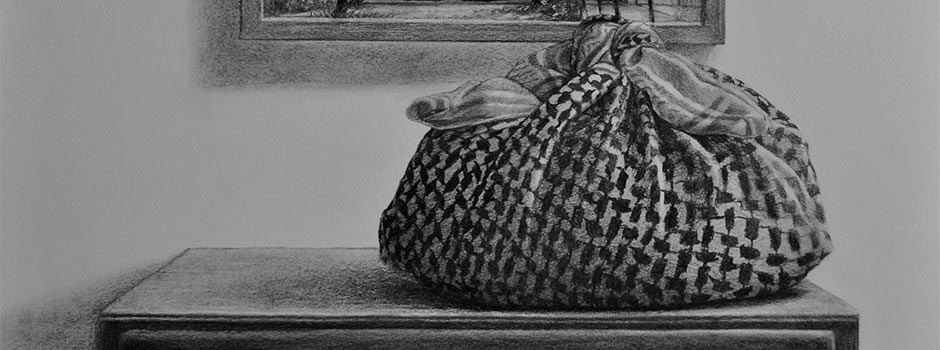
SOLO EXHIBITION Hungry for Home by the Palestinian Artist Samah Shihadi
Nov 27, 2018 INSPO, Exhibition

Hungry for Home is a collection of 18 compelling hyperrealist pencil and charcoal drawings that use traditional Palestinian food as a platform from which to explore deep-rooted cultural codes and memories. The act of eating is a powerful and intimate practice, the textures and flavours we encounter are absorbed into not only the body but also the memory. Food is something that we unite over and which can draw companionship into our lives. Shihadi’s powerfully realistic drawings, more closely aligned with photographs, use Palestine’s dishes and communal eating practices to communicate the collective experience of lost identity, displacement, and ultimately the artist’s aspiration to return home. “For the Palestinians living in the diaspora the table is an anchor point,†says Ranya Tabari Idliby, Palestinian author, based in New York, whose excerpts of writings on the same subject are displayed alongside the artworks. “It’s where families gather, and community is built. It’s where memories of a Palestine lost are shared and where a threatened Palestinian culture lives and thrives.â€
Themes of nostalgia and displacement unite the women, despite their distinct practices set against the context of continuing geopolitical unrest in Palestine, both Shihadi and Tabari Idliby express a desire shared by many in the Palestinian diaspora to return to one’s roots. Shihadi employs hyperrealist techniques to faithfully recapture the world she encounters. Since moving away from her family in Palestine to Israel, the artist finds comfort in food and cooking, a tangible reminder of her childhood and family; for Shihadi the family table becomes emblematic of one’s home, with Palestine’s traditions, recipes and stories being reawakened. This shared nostalgia becomes an anchor for the displaced and exiled, to their family past.
With the works in this exhibition, the artist depicts foods that are locally sourced in Palestine, including olives, thyme, grape leaves, legumes, fruit and milk. The indigenous cactus, a motif often used in Palestinian culture to represent a physical and emotional attachment to the land - as well as an emblem of Palestinian dispossession - is widely represented in Shihadi’s work. Tabari Idliby’s parents, both born in historic Palestine, were exiled in 1948 following the declaration of independence by Israel. Having grown up in Kuwait, the writer would learn about much of her heritage across the dinner table.
"As Palestinians, we cook to remember and we cook to forget. Our memories are flavoured by the food we eat and share. Meals are served in the shadow of loss; they tell our story; tell our truths. Food can at once be a panacea and a poison. We believe in its power to heal, to bless and jinx and trigger discord. Food can determine the sex of a gestating baby, induce labour and make mother’s milk. It is a barometer of a mother in law’s love.
Food is a measure of your guests. If the fried onions don’t burn and the cooked yoghurt does not curdle and the basmati rice is fluffy than your guests are affable. If the cooking proves to be arduous, the stew too salty, the okra too sinewy, then the guests are less than savory and they risk never being invited again.
The smaller the stuffed dolma, the more arduous the recipe - stuffed carrots - the more worthy our guests. All willing inter-generational communal hands are recruited for the effort. Food punctuates our lives. Commemorates our births, nags life into us as we mourn. Food reminds us that Palestine, a homeland absent is alive and remains in the aromas and recipes of our lives." (Ranya Tabari)
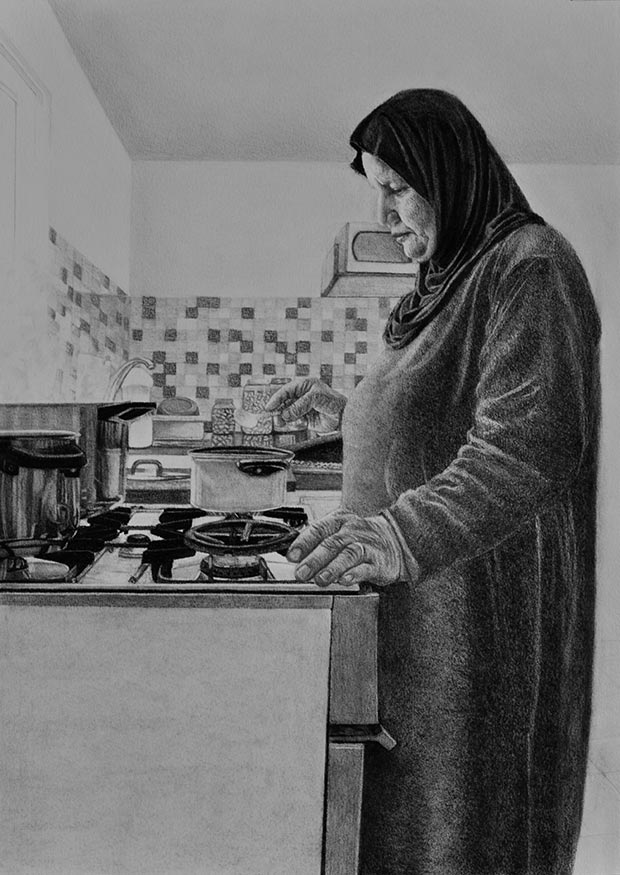 Samah Shihadi, Cooking, 2018, charcoal on paper, 60 x 40 cm / Courtesy of the artist and Tabari Artspace
Samah Shihadi, Cooking, 2018, charcoal on paper, 60 x 40 cm / Courtesy of the artist and Tabari Artspace
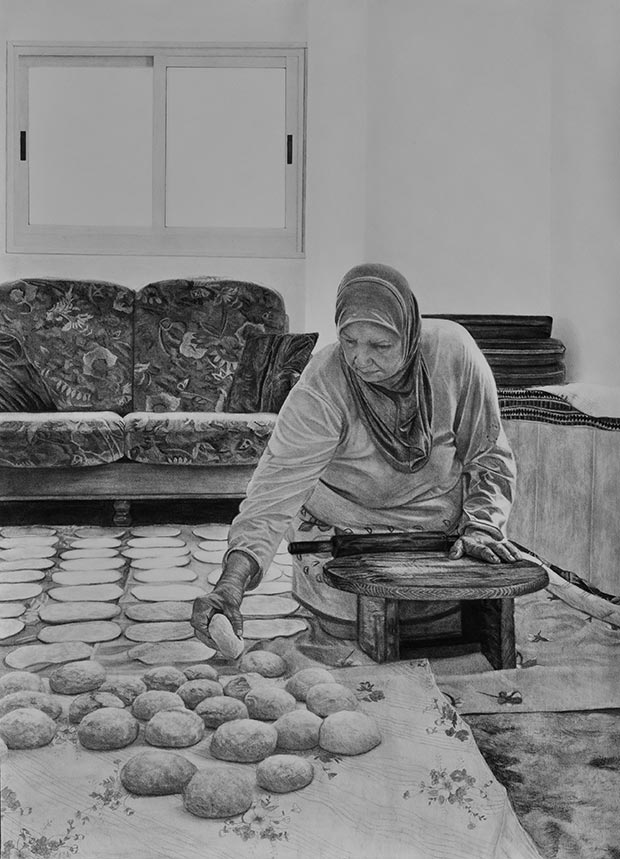 Samah Shihadi, Dough, 2018, charcoal on paper, 100 x 70 cm / Courtesy of the artist and Tabari Artspace
Samah Shihadi, Dough, 2018, charcoal on paper, 100 x 70 cm / Courtesy of the artist and Tabari Artspace
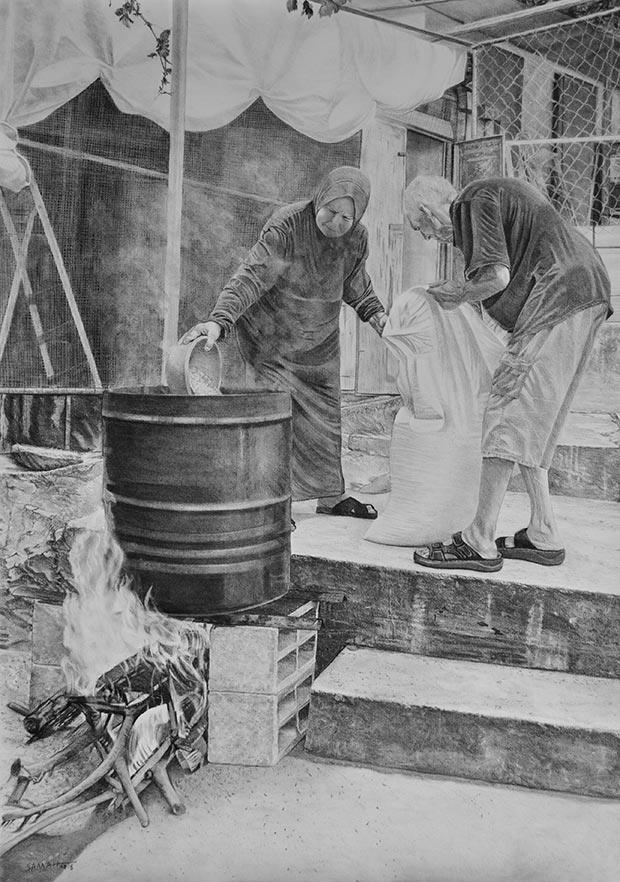 Samah Shihadi, Wheat, 2018, charcoal on paper, 100 x 70 cm / Courtesy of the artist and Tabari Artspace
Samah Shihadi, Wheat, 2018, charcoal on paper, 100 x 70 cm / Courtesy of the artist and Tabari Artspace
"The table is where Palestinians make homes - No matter the land, no matter the house, no matter our transience as refugees and the permanence of our transience as Palestinians. The table anchors our uprooted lives and comforts our yearning for home. Around the table we learn of homes lost in villages razed; we walk paths we can no longer walk. We meet neighbours; connect to family, listen to stories of ancestors buried in land denied. 'Just like it tasted in Palestine' is a rare compliment, given to the most exceptional of fruits that transport back to paradise lost. The fecundity of the land, 'Khier al Bilad' is a Palestine that many in diaspora imagine and taste around the table. Palestine is the land of fables: of orange groves, grapevines, of sun-drenched sweet berries, biblical figs and olive trees - not the barren land for a people without a land.
Mansaf is a feast of honour, rooted in the sweeping desert dunes of the Galilee, of Bedouin rituals of gallantry and hospitality. Mansaf is an occasion, a birth, a celebration. In its rituals, the deftly rolled bite-sized balls of yoghurt seeped rice cooked with mutton, served on a bed of paper - thin bread, are the rituals of Tiberius’s generational feast - A deliverance home.
When the hills of the Galilee were Palestine, Sheikh Saeed, gathered and led a procession of pure Arabian thoroughbreds, mounted by Tiberius’s proud and brave now broken and gone, to meet his son, a college graduate and a doctor, at the southern border of Lebanon to honour his return home. Along the road they rode, from the north of Tiberius to the south of Lebanon, tented resting stations every few kilometers had been sewn to hand out rosewater and lemonade and sweets and coffee and dates and garlands of jasmine too. Women dressed in their finest silk and hand embroidered Palestinian 'thaubs' (Kaftans), the ones they saved for special occasions, ululated with high pitched 'zaghareet', piercing, trilling the air with the music of celebration and joy. At home, in Tiberius, tented divans were set up for a month if not more, where pots of rice and tender lamb slowly cooked in cinnamon and cumin spiced yoghurt were daily prepared. Mansafs that fed the guests and curious well-wishers who came from surrounding farms and villages far and near, to see with their own two eyes the celebrated Doctor Galilee’s own." (Ranya Tabari)
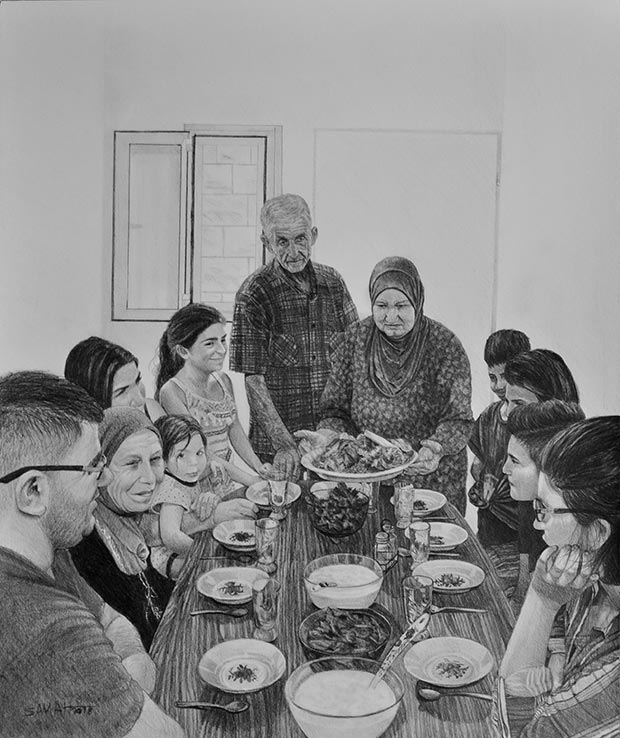 Samah Shihadi, Mansaf, 2018, pencil on paper, 33 x 40 cm / Courtesy of the artist and Tabari Artspace
Samah Shihadi, Mansaf, 2018, pencil on paper, 33 x 40 cm / Courtesy of the artist and Tabari Artspace
"Maliha the Jerusalem beauty did not want to leave. She was reluctant. How could she leave her home whose Jerusalem stone by stone she had picked, and the crimson hills of spring, colored by meadows of fiery red and orange anemone fields, that grew wild and free? How could she not picnic in the shade of her almond blossom trees, or harvest her young flowering green pistachios and ancient fruiting olive trees? How could she leave her terraced hilltop home touched by a gentle, cool breeze off the Sea of Galilee? How could she not hike its hills to Mount Bernice, walk its biblical shores or take its hot water cures? But the British General insisted, he even sent her a truck. She decided for the safety of her daughters she must leave. She left with nothing but two rugs to line the cold metal in the back of the truck and a bundle around which they huddled. Patience, she thought. We should soon return." (Ranya Tabari)
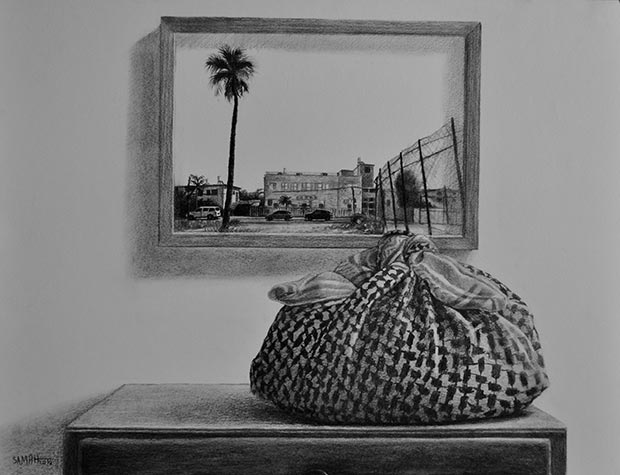 Samah Shihadi, Bundle from Home, Bukhje 2018, charcoal on paper, 65 x 50 cm / Courtesy of the artist and Tabari Artspace
Samah Shihadi, Bundle from Home, Bukhje 2018, charcoal on paper, 65 x 50 cm / Courtesy of the artist and Tabari Artspace
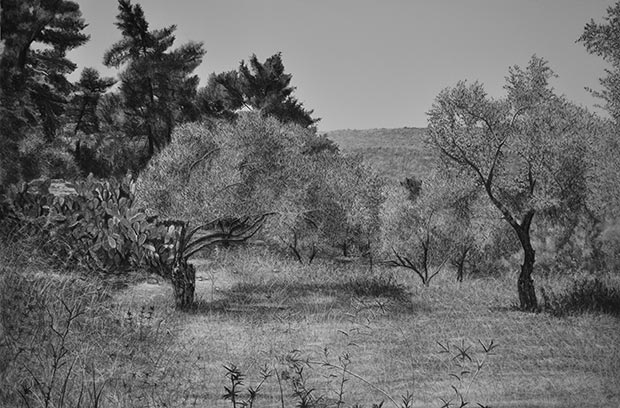 Samah Shihadi, Landscape/ Olive trees, 2018, charcoal on paper, 175 x 105 / Courtesy of the artist and Tabari Artspace
Samah Shihadi, Landscape/ Olive trees, 2018, charcoal on paper, 175 x 105 / Courtesy of the artist and Tabari Artspace
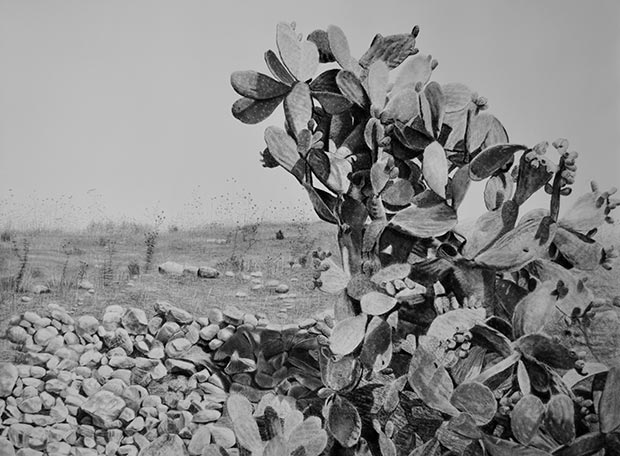 Samah Shihadi, Sabr, 2018, charcoal on paper, 200 x 150 cm / Courtesy of the artist and Tabari Artspace
Samah Shihadi, Sabr, 2018, charcoal on paper, 200 x 150 cm / Courtesy of the artist and Tabari Artspace
"The taste of warm fresh baked 'manaeesh' flatbreads topped with Zaatar, or cheese dipped in sweet milky tea is the song of childhood; of youth and innocence and all that is good. The aromas of doughy goods, warm out of the oven, Zaatar and olive oil manaeesh, is a celestial deliverance home. For Palestinians, olive oil and Zaatar are umbilical cords to severed land. Zaatar, an indigenous variety of thyme - biblical hyssop and the branch brought up to Jesus’s lips on the cross - grows wild and free on the hills of hallowed land. For centuries it's been foraged by Palestinians, a practice now made illegal.
Tins of olives and olive oil pressed fresh and green, are Palestine’s prized gifts. Families picnic to celebrate the fall harvest of rooted olive trees, engorged, centuries-old on ancient land. The pressed olives are anointed oil for a gnawing ache for a land missed not dulled but made sharper by time." (Ranya Tabari)
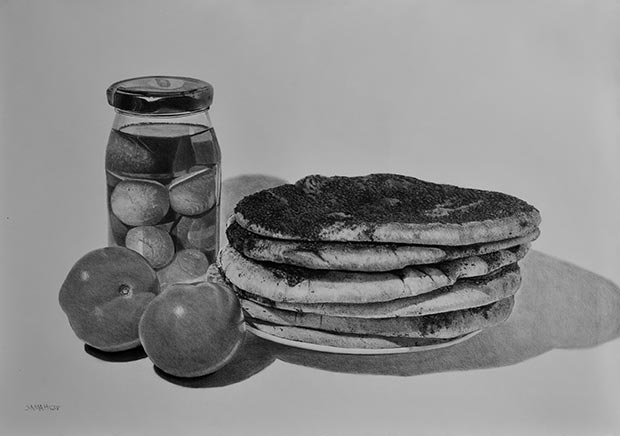 Samah Shihadi, Manaeesh and labneh, 2018, charcoal on paper, 105 x 75 cm / Courtesy of the artist and Tabari Artspace
Samah Shihadi, Manaeesh and labneh, 2018, charcoal on paper, 105 x 75 cm / Courtesy of the artist and Tabari Artspace
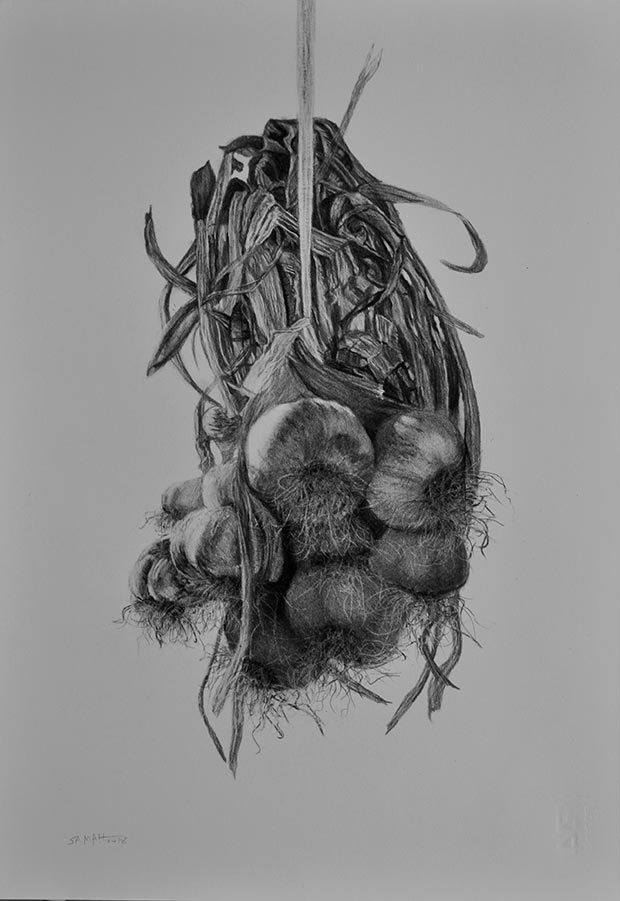 Samah Shihadi, ‘Hanging’ series, 2018, charcoal on paper, 48 x 33 cm each / Courtesy of the artist and Tabari Artspace
Samah Shihadi, ‘Hanging’ series, 2018, charcoal on paper, 48 x 33 cm each / Courtesy of the artist and Tabari Artspace
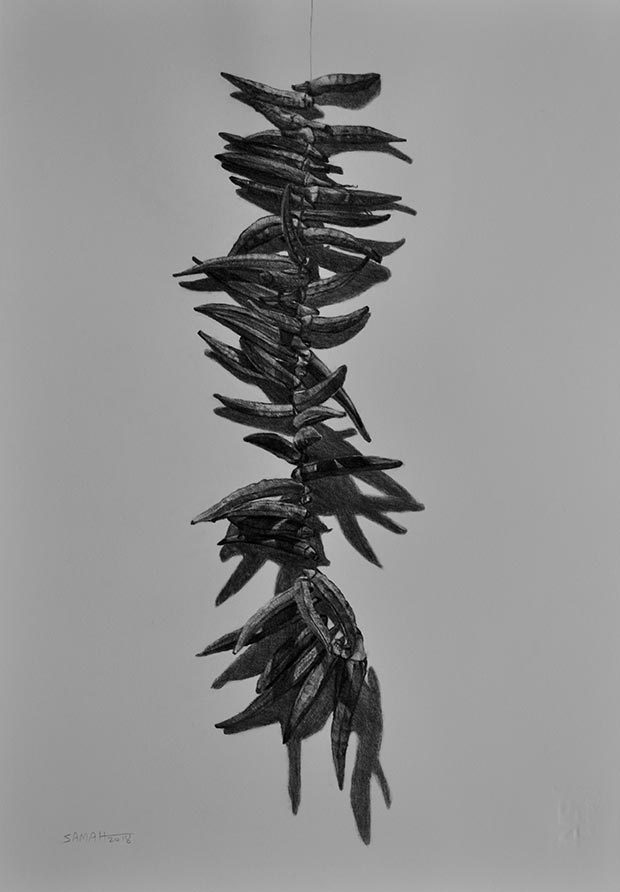 Samah Shihadi, ‘Hanging’ series, 2018, charcoal on paper, 48 x 33 cm each / Courtesy of the artist and Tabari Artspace
Samah Shihadi, ‘Hanging’ series, 2018, charcoal on paper, 48 x 33 cm each / Courtesy of the artist and Tabari Artspace
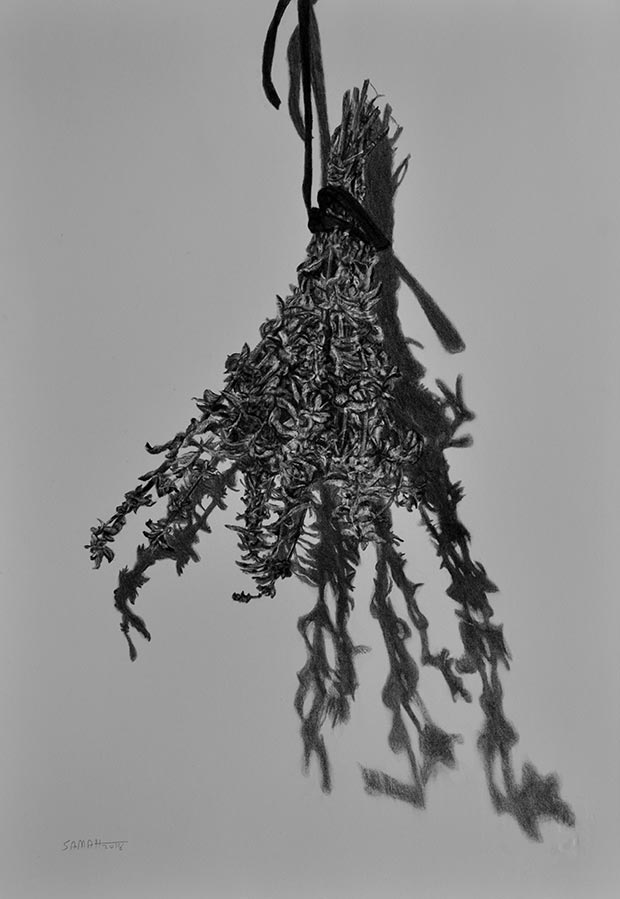 Samah Shihadi, ‘Hanging’ series, 2018, charcoal on paper, 48 x 33 cm each / Courtesy of the artist and Tabari Artspace
Samah Shihadi, ‘Hanging’ series, 2018, charcoal on paper, 48 x 33 cm each / Courtesy of the artist and Tabari Artspace
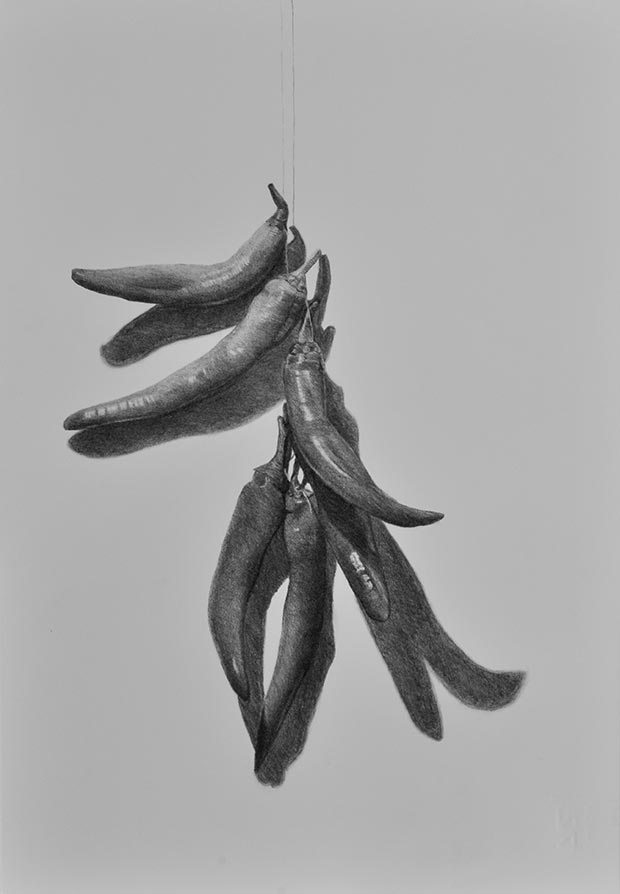 Samah Shihadi, ‘Hanging’ series, 2018, charcoal on paper, 48 x 33 cm each / Courtesy of the artist and Tabari Artspace
Samah Shihadi, ‘Hanging’ series, 2018, charcoal on paper, 48 x 33 cm each / Courtesy of the artist and Tabari Artspace
Samah Shihadi was born in 1987. She is based in Haifa. Samah Shihadi graduated with a BA in art from Oranim College, Israel (2012) and an MFA from Haifa University, Israel (2015). Shihadi began her career as an artist at an early age and, having spent seven years studying art, has become a keen draghtsman. Shihadi‘s artistic practice employs hyperreal drawing; her pencil and charcoal work is touching and thought-provoking. The artist is profoundly interested in the daily challenges that women face. Shihadi has received numerous prizes and exhibited consistently in the world.
Ranya Tabari was born in 1965, Kuwait. Based in New York, Ranya Tabari Idliby graduated with a BS in International Relations from Georgetown University, USA (1987), MS in International Relations from London School of Economics, UK (1987) and was a PhD candidate at the London School of Economics (1994). She is the co-author of The Faith Club (2006), a New York Times best-seller currently in its twelfth edition. She also wrote Burqas, Baseball, and Apple Pie: Being Muslim in America (2014).
Comments
Add a comment